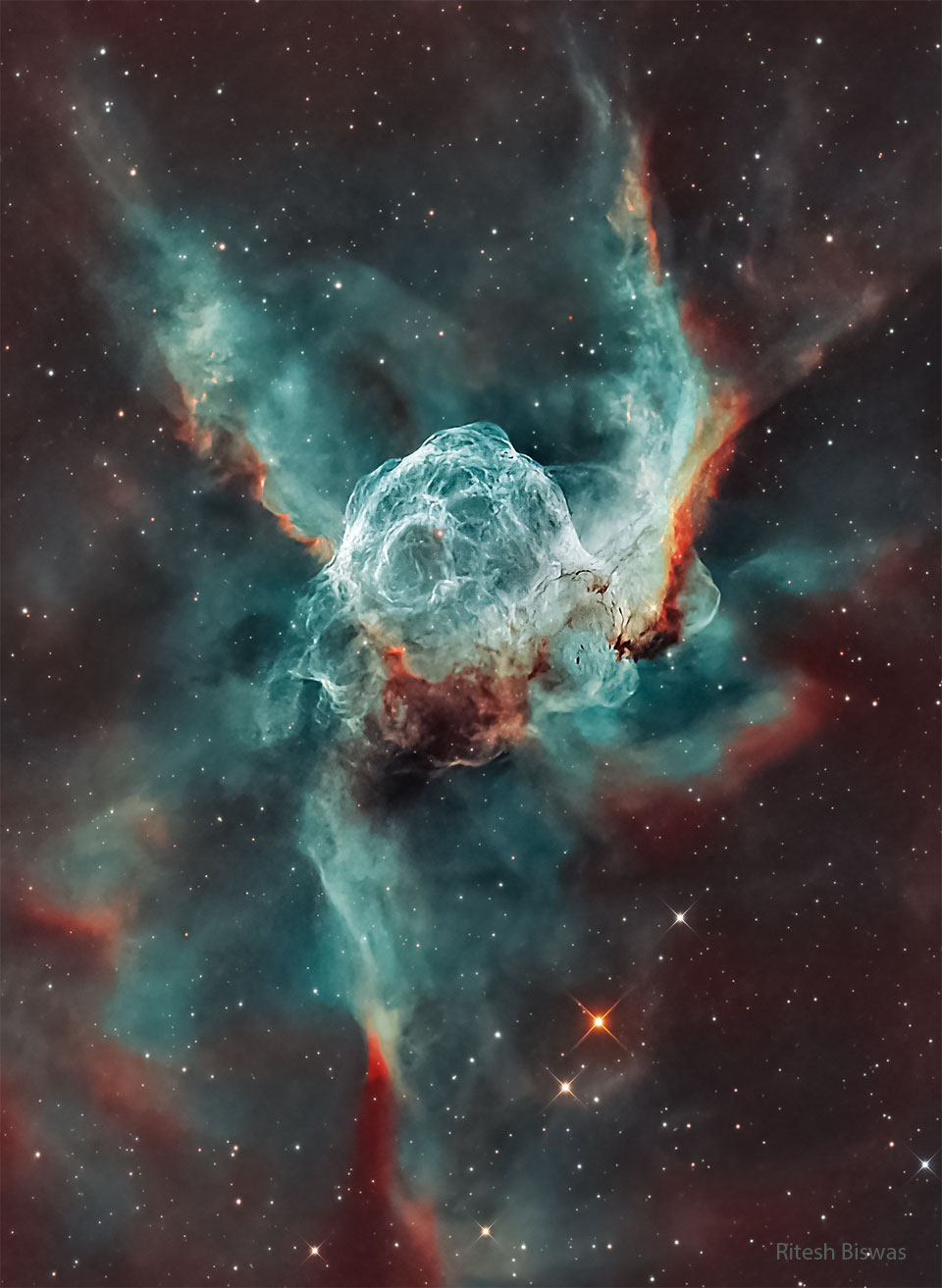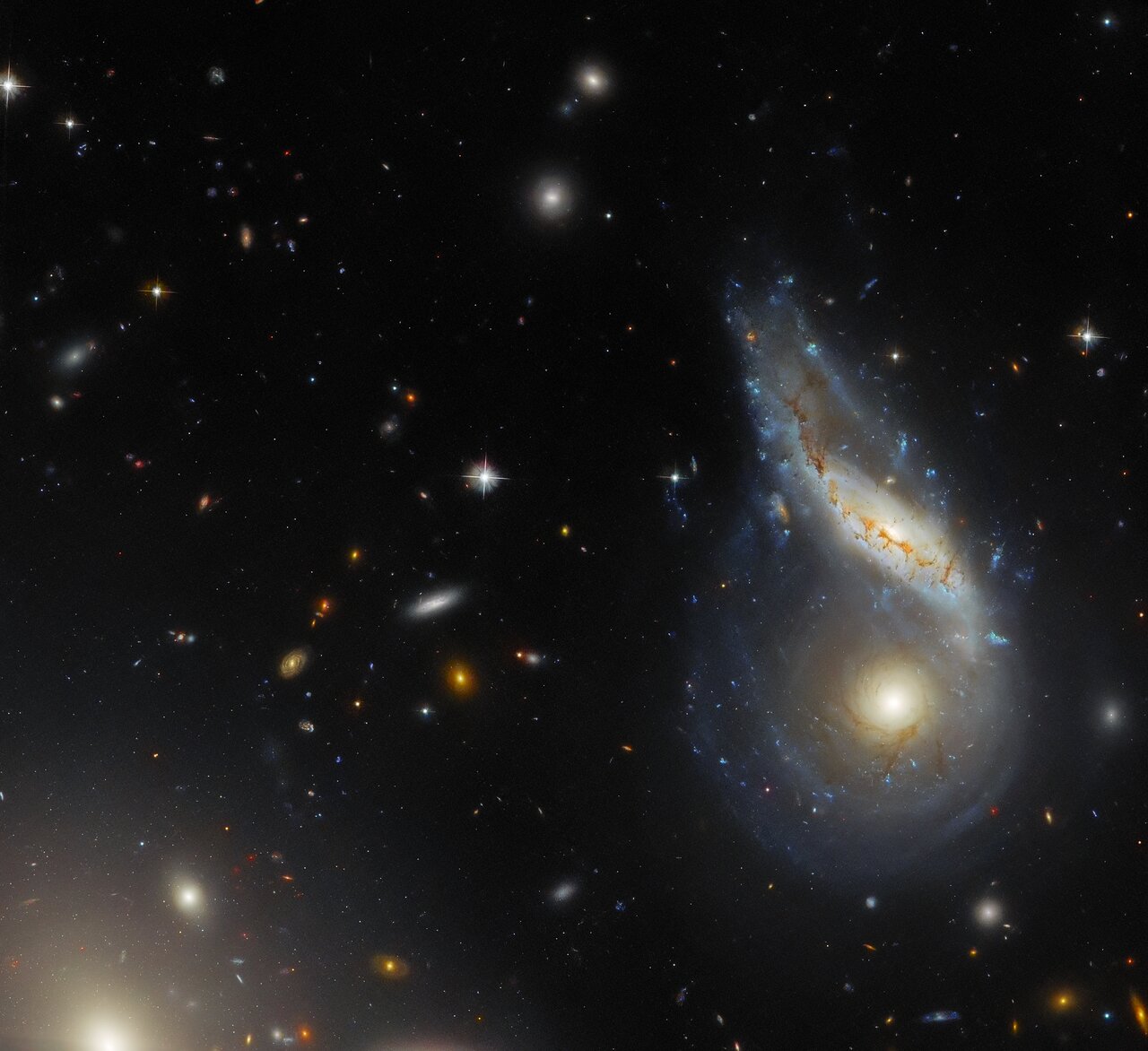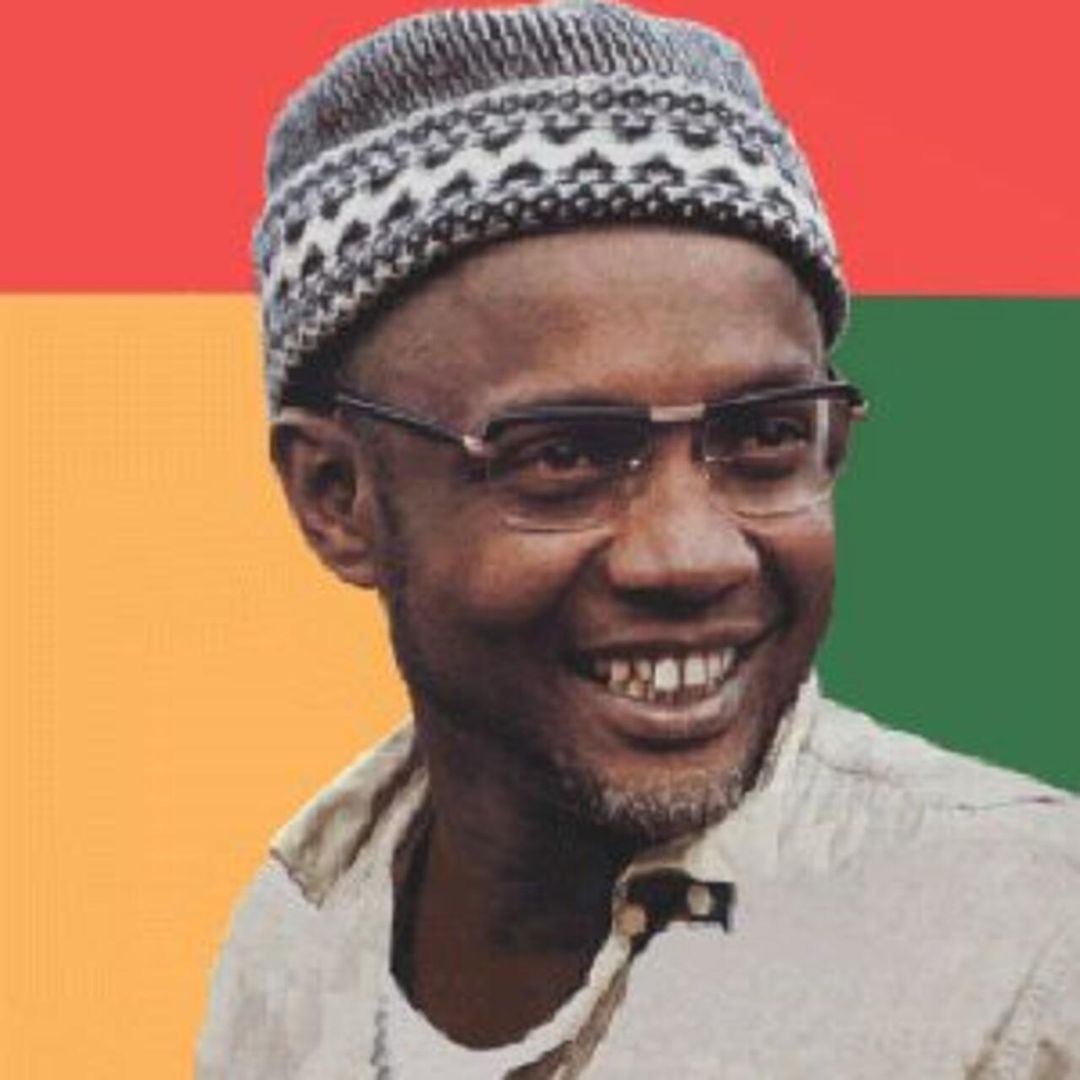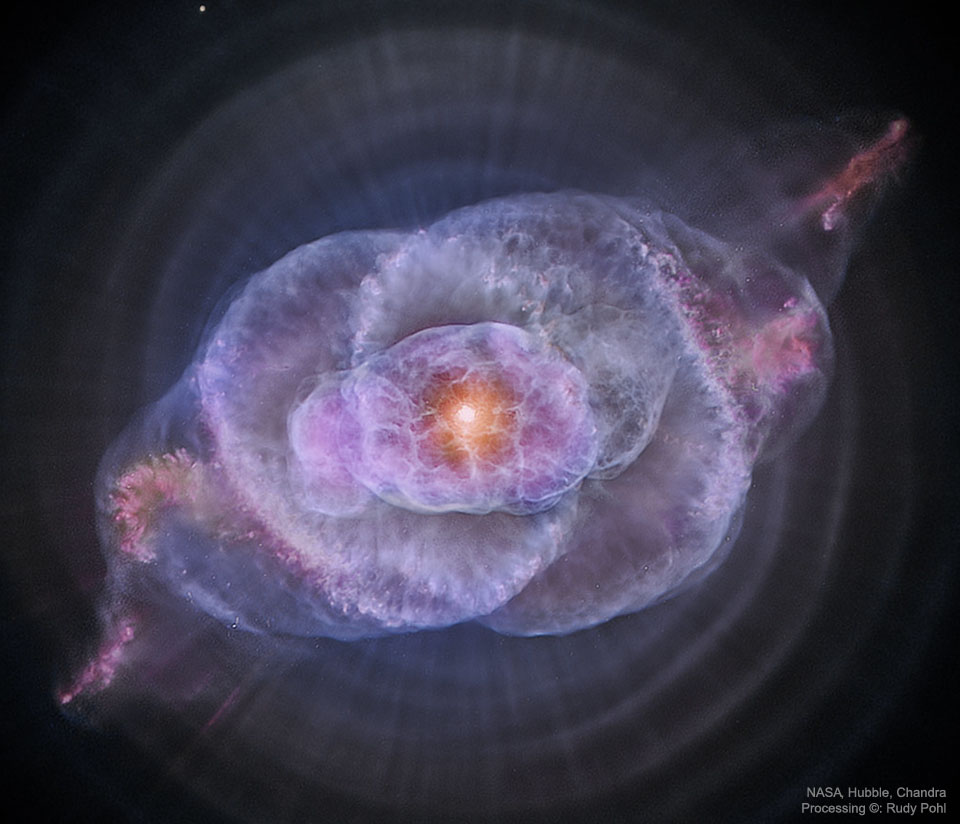Thor’s Helmet, NGC 2359 is a hat-shaped cosmic cloud with wing-like appendages. Heroically sized even for a Norse god, Thor’s Helmet is about 30 light-years across. In fact, the cosmic head-covering is more like an interstellar bubble, blown with a fast wind from the bright, massive star near the bubble’s center. Known as a Wolf-Rayet star, the central star is an extremely hot giant thought to be in a brief, pre-supernova stage of evolution. NGC 2359 is located about 15,000 light-years away toward the constellation of the Great Overdog. This remarkably sharp image is a mixed cocktail of data from narrowband filters, capturing not only natural looking stars but details of the nebula’s filamentary structures. The star in the center of Thor’s Helmet is expected to explode in a spectacular supernova sometime within the next few thousand years.

James Patrick Page OBE (born 9 January 1944) is an English musician and producer who achieved international success as the guitarist and founder of the rock band Led Zeppelin. Prolific in creating guitar riffs, Page’s style involves various alternative guitar tunings and melodic solos, coupled with aggressive, distorted guitar tones. It is also characterized by his folk and eastern-influenced acoustic work. He is notable for occasionally playing his guitar with a cello bow to create a droning sound texture to the music.
Page began his career as a studio session musician in London and, by the mid-1960s, alongside Big Jim Sullivan, was one of the most sought-after session guitarists in Britain. He was a member of the Yardbirdsfrom 1966 to 1968. When the Yardbirds broke up, he founded Led Zeppelin, which was active from 1968 to 1980. Following the death of Led Zeppelin drummer John Bonham, he participated in a number of musical groups throughout the 1980s and 1990s, more specifically XYZ, the Firm, the Honeydrippers, Coverdale–Page, and Page and Plant. Since 2000, Page has participated in various guest performances with many artists, both live and in studio recordings, and participated in a one-off Led Zeppelin reunion in 2007 that was released as the 2012 concert film Celebration Day. Along with the Edge and Jack White, he participated in the 2008 documentary It Might Get Loud.
Page is widely considered to be one of the greatest and most influential guitarists of all time. Rolling Stone magazine has described Page as “the pontiff of power riffing” and ranked him number three in their 2015 list of the “100 Greatest Guitarists of All Time”, behind Jimi Hendrix and Eric Clapton, and ranking 3rd again in 2023 behind Chuck Berry and Jimi Hendrix. In 2010, he was ranked number two in Gibson‘s list of “Top 50 Guitarists of All Time” and, in 2007, number four on Classic Rock‘s “100 Wildest Guitar Heroes”. He was inducted into the Rock and Roll Hall of Fame twice: once as a member of the Yardbirds (1992) and once as a member of Led Zeppelin (1995).
see full post...
Joan Chandos Baez (born January 9, 1941) is an American singer, songwriter, musician, and activist. Her contemporary folk music often includes songs of protest and social justice. Baez has performed publicly for over 60 years, releasing more than 30 albums. Fluent in Spanish and English, she has also recorded songs in at least six other languages.
Baez is generally regarded as a folk singer, but her music has diversified since the counterculture era of the 1960s and encompasses genres such as folk rock, pop, country, and gospel music. She began her recording career in 1960 and achieved immediate success. Her first three albums, Joan Baez, Joan Baez, Vol. 2 and Joan Baez in Concert, all achieved gold record status. Although a songwriter herself, Baez generally interprets other composers’ work, having recorded songs by the Allman Brothers Band, the Beatles, Jackson Browne, Leonard Cohen, Woody Guthrie, Violeta Parra, the Rolling Stones, Pete Seeger, Paul Simon, Stevie Wonder, Bob Marley, and many others. She was one of the first major artists to record the songs of Bob Dylan in the early 1960s; Baez was already an internationally celebrated artist and did much to popularize his early songwriting efforts. Her tumultuous relationship with Dylan later became the subject of songs from both and generated much public speculation. On her later albums she has found success interpreting the work of more recent songwriters, including Ryan Adams, Josh Ritter, Steve Earle, Natalie Merchant, and Joe Henry.
Baez’s acclaimed songs include “Diamonds & Rust” and covers of Phil Ochs‘s “There but for Fortune” and The Band‘s “The Night They Drove Old Dixie Down“. She is also known for “Farewell, Angelina“, “Love Is Just a Four-Letter Word“, “Forever Young“, “Here’s to You“, “Joe Hill“, “Sweet Sir Galahad” and “We Shall Overcome“. Baez performed fourteen songs at the 1969 Woodstock Festival and has displayed a lifelong commitment to political and social activism in the fields of nonviolence, civil rights, human rights, and the environment. Baez was inducted into the Rock and Roll Hall of Fame on April 7, 2017.
Baez was born in the Staten Island borough of New York City on January 9, 1941.
see full post...Kenneth Clarke Spearman (January 9, 1914 – January 26, 1985), nicknamed Klook, was an American jazz drummer and bandleader. A major innovator of the bebop style of drumming, he pioneered the use of the ride cymbal to keep time rather than the hi-hat, along with the use of the bass drum for irregular accents (“dropping bombs“).
Born in Pittsburgh, Pennsylvania, he was orphaned at the age of about five and began playing the drums when he was eight or nine on the urging of a teacher at his orphanage. Turning professional in 1931 at the age of seventeen, he moved to New York City in 1935 when he began to establish his drumming style and reputation. As the house drummer at Minton’s Playhouse in the early 1940s, he participated in the after-hours jams that led to the birth of bebop. After military service in the US and Europe between 1943 and 1946, he returned to New York, but from 1948 to 1951 he was mostly based in Paris. He stayed in New York between 1951 and 1956, performing with the Modern Jazz Quartet and playing on early Miles Davisrecordings. He then moved permanently to Paris, where he performed and recorded with European and visiting American musicians and co-led the Kenny Clarke/Francy Boland Big Band between 1961 and 1972. He continued to perform and record until the month before he died of a heart attack in January 1985.
Clarke was born in Pittsburgh, Pennsylvania on January 9, 1914 as the youngest of two sons, to Martha Grace Scott, a pianist from Pittsburgh, and Charles Spearman, a trombonist from Waycross, Georgia. The family home was on Wylie Avenue in the Lower Hill District of Pittsburgh. Clarke’s father left the household to start a new family in Yakima, Washington, and his mother, who began a relationship with a Baptist preacher shortly afterwards, died suddenly in her late twenties when Clarke was about five, leaving him an orphan.
see full post...John Paul “Bucky” Pizzarelli (January 9, 1926 – April 1, 2020) was an American jazz guitarist.
He was the father of jazz guitarist John Pizzarelli and double bassist Martin Pizzarelli. He worked for NBCas a staffman for Dick Cavett (1971) and ABC with Bobby Rosengarden in (1952). Musicians he collaborated with include Benny Goodman, George Barnes, Les Paul, Stéphane Grappelli, Benny Green, and Antônio Carlos Jobim. Pizzarelli cited as influences Django Reinhardt, Freddie Green, and George Van Eps.
Pizzarelli was born on January 9, 1926, in Paterson, New Jersey, United States. He learned to play guitar and banjo at a young age. His uncles, Pete and Bobby Domenick, were professional musicians, and sometimes the extended family would gather at one of their homes with their guitars for jam sessions. Pizzarelli cited blind accordion player Joe Mooney as an inspiration. Mooney led a quartet that included Pizzarelli’s uncle, Bobby Domenick. During high school, Pizzarelli was the guitarist for a small band that performed classical music.
see full post...This Hubble Picture of the Week features Arp 122, a peculiar galaxy that in fact comprises two galaxies — NGC 6040, the tilted, warped spiral galaxy and LEDA 59642, the round, face-on spiral — that are in the midst of a collision. This dramatic cosmic encounter is located at the very safe distance of roughly 570 million light-years from Earth. Peeking in at the corner is the elliptical galaxy NGC 6041, a central member of the galaxy cluster that Arp 122 resides in, but otherwise not participating in this monster merger.
Galactic collisions and mergers are monumentally energetic and dramatic events, but they take place on a very slow timescale. For example, the Milky Way is on track to collide with its nearest galactic neighbour, the Andromeda Galaxy (M31), but these two galaxies have a good four billion years to go before they actually meet. The process of colliding and merging will not be a quick one either: it might take hundreds of millions of years to unfold. These collisions take so long because of the truly massive distances involved.
Galaxies are composed of stars and their solar systems, dust and gas. In galactic collisions, therefore, these constituent components may experience enormous changes in the gravitational forces acting on them. In time, this completely changes the structure of the two (or more) colliding galaxies, and sometimes ultimately results in a single, merged galaxy. That may well be what results from the collision pictured in this image. Galaxies that result from mergers are thought to have a regular or elliptical structure, as the merging process disrupts more complex structures (such as those observed in spiral galaxies). It would be fascinating to know what Arp 122 will look like once this collision is complete . . . but that will not happen for a long, long time.
[Image Description: Two spiral galaxies are merging together at the right side of the image. One is seen face-on and is circular in shape. The other seems to lie in front of the first one. This galaxy is seen as a disc tilted away from the viewer and it is partially warped. In the lower-left corner, cut off by the frame, a large elliptical galaxy appears as light radiating from a point. Various small galaxies cover the background.]

Dame Shirley Veronica Bassey CH DBE (/ˈbæsi/; born 8 January 1937) is a Welsh singer. Best known for her career longevity, powerful voice and recording the theme songs to three James Bond films, Bassey is widely regarded as one of the most popular vocalists in Britain.
Born in Cardiff, Bassey began performing as a teenager in 1953. In 1959, she became the first Welsh person to gain a number-one single on the UK Singles Chart. In the following decades, Bassey amassed 27 Top 40 hits in the UK, including two number-ones (As I Love You and AA: Climb Ev’ry Mountain/Reach For The Stars) plus a number-one on the Dance Chart (History Repeating). She became well-known for recording the soundtrack theme songs of the James Bond films Goldfinger (1964), Diamonds Are Forever(1971), and Moonraker (1979). In 2020, Bassey became the first female artist to chart an album in the Top 40 of the UK Albums Chart in seven consecutive decades with her album I Owe It All To You.
Bassey has also had numerous BBC television specials, and she hosted her own variety series, Shirley Bassey. In 2011, BBC aired the television film Shirley, based on Bassey’s life and career. Since making her first appearance at the Royal Albert Hall in 1971, she has performed at the venue 45 times. Bassey received the first award for Best British Female Solo Artist at the 1st Brit Awards in 1977. She was appointed a Dame in 1999 for services to the performing arts. In 2003, she was ranked among the “100 Great Black Britons“. Her song “Goldfinger” was inducted into the Grammy Hall of Fame in 2008. She has influenced many other singers, including Aretha Franklin.
In a career spanning over 70 years, Bassey has sold over 140 million records worldwide, making her one of the best-selling female artists of all time. She is the first woman in history to claim a Top 40 album in seven consecutive decades in the United Kingdom.
see full post...David Robert Jones (8 January 1947 – 10 January 2016), known professionally as David Bowie , was an English singer, songwriter, musician, and actor. A leading figure in the music industry, he is regarded as one of the most influential musicians of the 20th century. Bowie was acclaimed by critics and musicians, particularly for his innovative work during the 1970s. His career was marked by reinvention and visual presentation, and his music and stagecraft had a significant impact on popular music.
Bowie developed an interest in music from an early age. He studied art, music and design before embarking on a professional career as a musician in 1963. He released a string of unsuccessful singles with local bands and a solo album before achieving his first top five entry on the UK Singles Chart with “Space Oddity“, released in 1969. After a period of experimentation, he re-emerged in 1972 during the glam rock era with the flamboyant and androgynous alter ego Ziggy Stardust. The character was spearheaded by the success of “Starman” and album The Rise and Fall of Ziggy Stardust and the Spiders from Mars, which won him widespread popularity. In 1975, Bowie’s style shifted towards a sound he characterised as “plastic soul“, initially alienating many of his UK fans but garnering him his first major US crossover success with the number-one single “Fame” and the album Young Americans. In 1976, Bowie starred in the cult film The Man Who Fell to Earth and released Station to Station. In 1977, he again changed direction with the electronic-inflected album Low, the first of three collaborations with Brian Enothat came to be known as the Berlin Trilogy. “Heroes” (1977) and Lodger (1979) followed; each album reached the UK top five and received lasting critical praise.
After uneven commercial success in the late 1970s, Bowie had three number-one hits: the 1980 single “Ashes to Ashes“, its album Scary Monsters (and Super Creeps) and “Under Pressure” (a 1981 collaboration with Queen). He achieved his greatest commercial success in the 1980s with Let’s Dance(1983). Between 1988 and 1992, he fronted the hard rock band Tin Machine before resuming his solo career in 1993. Throughout the 1990s and 2000s, Bowie continued to experiment with musical styles, including industrial and jungle. He also continued acting; his roles included Major Jack Celliers in Merry Christmas, Mr. Lawrence (1983), Jareth the Goblin King in Labyrinth (1986), Phillip Jeffries in Twin Peaks: Fire Walk with Me (1992), Andy Warhol in the biopic Basquiat (1996), and Nikola Tesla in The Prestige(2006), among other film and television appearances and cameos. He stopped touring after 2004 and his last live performance was at a charity event in 2006. He returned from a decade-long recording hiatus in 2013 with The Next Day and remained musically active until his death from liver cancer in 2016. He died two days after both his 69th birthday and the release of his final album, Blackstar.
During his lifetime, his record sales, estimated at over 100 million records worldwide, made him one of the best-selling musicians of all time. Often dubbed the “chameleon of rock” due to his constant musical reinventions, he was inducted into the Rock and Roll Hall of Fame in 1996. Rolling Stone ranked him among the greatest artists in history. As of 2022, Bowie was the best-selling vinyl artist of the 21st century.
see full post...Elvis Aaron Presley (January 8, 1935 – August 16, 1977 Tupelo, Mississippi), also known mononymously as Elvis, was an American singer and actor. Known as the “King of Rock and Roll“, he is regarded as one of the most significant cultural figures of the 20th century. Presley’s energized interpretations of songs and sexually provocative performance style, combined with a singularly potent mix of influences across color lines during a transformative era in race relations, brought both great success and initial controversy.
Presley was born in Tupelo, Mississippi; his family relocated to Memphis, Tennessee, when he was 13. His music career began there in 1954, at Sun Records with producer Sam Phillips, who wanted to bring the sound of African-American music to a wider audience. Presley, on guitar and accompanied by lead guitarist Scotty Moore and bassist Bill Black, was a pioneer of rockabilly, an uptempo, backbeat-driven fusion of country music and rhythm and blues. In 1955, drummer D. J. Fontana joined to complete the lineup of Presley’s classic quartet and RCA Victor acquired his contract in a deal arranged by Colonel Tom Parker, who would manage him for more than two decades. Presley’s first RCA Victor single, “Heartbreak Hotel“, was released in January 1956 and became a number-one hit in the United States. Within a year, RCA Victor would sell ten million Presley singles. With a series of successful television appearances and chart-topping records, Presley became the leading figure of the newly popular rock and roll; though his performative style and promotion of the then-marginalized sound of African Americans led to him being widely considered a threat to the moral well-being of white American youth.
In November 1956, Presley made his film debut in Love Me Tender. Drafted into military service in 1958, he relaunched his recording career two years later with some of his most commercially successful work. Presley held few concerts, however, and guided by Parker, proceeded to devote much of the 1960s to making Hollywood films and soundtrack albums, most of them critically derided. Some of Presley’s most famous films included Jailhouse Rock (1957), Blue Hawaii (1961), and Viva Las Vegas (1964). In 1968, following a seven-year break from live performances, he returned to the stage in the acclaimed NBC television comeback special Elvis, which led to an extended Las Vegas concert residency and a string of highly profitable tours. In 1973, Presley gave the first concert by a solo artist to be broadcast around the world, Aloha from Hawaii. However, years of prescription drug abuse and unhealthy eating habits severely compromised his health, and Presley died unexpectedly in August, 1977 at his Graceland estate at the age of 42.
Having sold roughly 400 million records worldwide, Presley is one of the best-selling music artists of all time. He was commercially successful in many genres, including pop, country, rhythm & blues, adult contemporary, and gospel. He won three Grammy Awards, received the Grammy Lifetime Achievement Award at age 36, and has been inducted into multiple music halls of fame. He also holds several records, including the most RIAA-certified gold and platinum albums, the most albums charted on the Billboard 200, the most number-one albums by a solo artist on the UK Albums Chart, and the most number-one singles by any act on the UK Singles Chart. In 2018, Presley was posthumously awarded the Presidential Medal of Freedom.
see full post...Dave Weckl (born January 8, 1960 in St. Louis, Missouri) is an American jazz fusion drummer and the leader of the Dave Weckl Band. He was inducted into the Modern Drummer Hall of Fame in 2000.
Weckl started playing his first set of drums at age 8 in his spare room along with records. He later played in the living room, sometimes with his father on piano. Weckl studied at the University of Bridgeport.Starting out on the New York fusion scene in the early 1980s, Weckl soon began working with artists such as Paul Simon, George Benson, Michel Camilo, Robert Plant, and Anthony Jackson.
He was with the Chick Corea Elektric Band from 1985 to 1991. During this time he performed on many albums and also appeared with Corea’s Akoustic Band.
see full post...Hudson Whittaker (born Hudson Woodbridge; January 8, 1903 – March 19, 1981), known as Tampa Red, was an American Chicago blues musician. His distinctive single-string slide guitar style, songwriting and bottleneck technique influenced other Chicago blues guitarists such as Big Bill Broonzy, Robert Nighthawk, Muddy Waters, and Elmore James.In a career spanning over 30 years, he also recorded pop, R&B and hokum songs. His best-known recordings include “Anna Lou Blues”, “Black Angel Blues“, “Crying Won’t Help You”, “It Hurts Me Too“, and “Love Her with a Feeling“.
Tampa Red was born Hudson Woodbridge in Smithville, Georgia. The date of his birth is uncertain, with Tampa himself giving years varying from 1900 to 1908. The birth date given on his death certificate is January 8, 1904.
see full post...

It is actually one of the brightest and most highly detailed planetary nebula known, composed of gas expelled in the brief yet glorious phase near the end of life of a Sun-like star. This nebula‘s dying central star may have produced the outer circular concentric shells by shrugging off outer layers in a series of regular convulsions. The formation of the beautiful, complex-yet-symmetric inner structures, however, is not well understood. The featured image is a composite of a digitally sharpened Hubble Space Telescope image with X-ray light captured by the orbiting Chandra Observatory. The exquisite floating space statue spans over half a light-year across. Of course, gazing into this Cat’s Eye, humanity may well be seeing the fate of our sun, destined to enter its own planetary nebula phase of evolution … in about 5 billion years.

see full post...
Kenneth Clark Loggins (born January 7, 1948) is an American singer, guitarist and songwriter. His early songs were recorded with the Nitty Gritty Dirt Band in 1970, which led to seven albums recorded with Jim Messina as Loggins and Messina from 1972 to 1977. His early soundtrack contributions date back to A Star Is Born in 1976, and he is known as the King of the Movie Soundtrack. As a solo artist, Loggins experienced a string of soundtrack successes, including an Academy Award nomination for “Footloose” in 1985. Finally Home was released in 2013, shortly after Loggins formed the group Blue Sky Riders with Gary Burr and Georgia Middleman. He won a Daytime Emmy Award, two Grammy Awardsand was nominated for an Academy Award, a Tony Award and a Golden Globe Award.
Loggins was born in Everett, Washington, the youngest of three brothers. His father, Robert George Loggins, was a salesman of English and Irish ancestry, while his mother, Lina (née Massie), was a homemaker of Italian descent, from Avezzano.
see full post...
Earl Wilberforce “Wire” Lindo (7 January 1953 – 4 September 2017), sometimes referred to as Wya, was a Jamaican reggae musician. He was a member of Bob Marley and the Wailers and collaborated with numerous reggae artists including Burning Spear.
While attending Excelsior High School in Jamaica, he played with Barry Biggs, Mikey “Boo” Richards, and Ernest Wilson in the Astronauts, and later played organ in the band Now Generation, and with Tommy McCook and the Supersonics, and the Meters. Aston “Familyman” Barrett heard Lindo and recommended him to play for a Saturday afternoon television program Where It’s At on JBC. Lindo also spent his early days working at Coxsone Dodd‘s Studio One, where he played on innumerable recordings.
In 1973, he was invited to join The Wailers on a US tour, going on to play on Burnin’. He left the Wailers in 1974 to join Taj Mahal‘s band.
see full post...